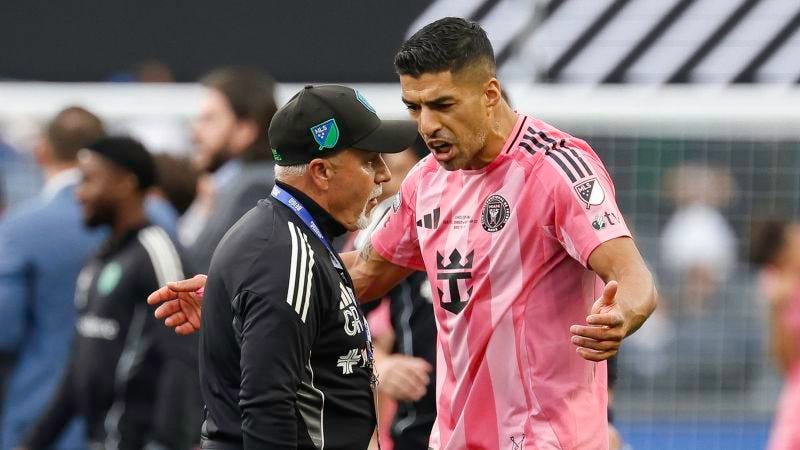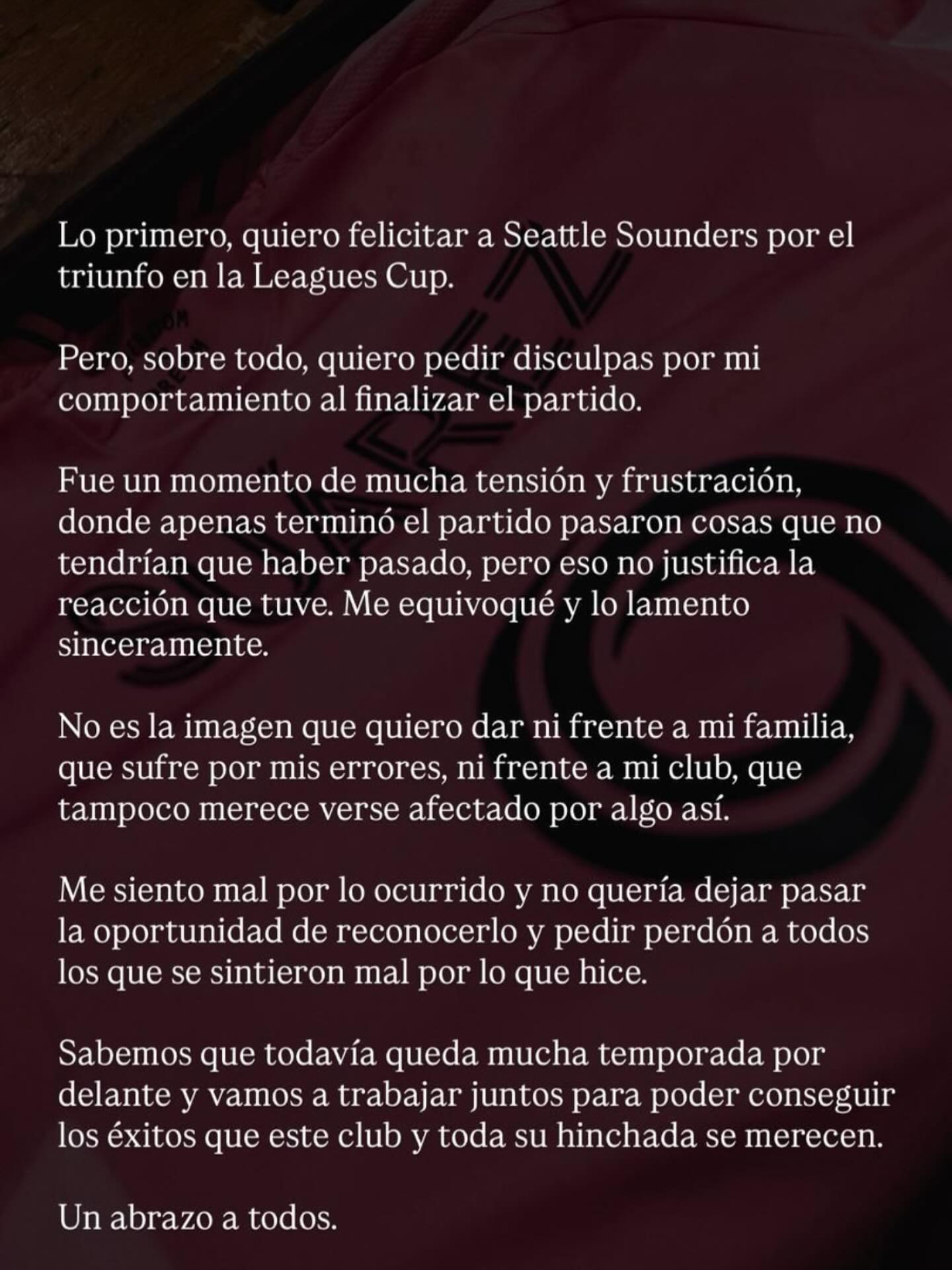Luis Suárez, Genius on the Pitch, Trouble at the Whistle...Again
A fresh ban for spitting, a long history of flashpoints, and why Inter Miami, and the game, need a different ending
Luis Suárez, a fresh ban and the same old questions
There are footballers who dazzle you, and there are footballers who divide you. Luis Suárez does both. The feet are quick, the brain is quicker, the hunger is unmistakable. Then there is the other part, the streak that bubbles over and drags the rest of us into a long debate about talent, responsibility and lines that should never be crossed. The latest incident in Seattle sits squarely in that second category, and it forces us once again to weigh the footballer against the turmoil he leaves behind.
What happened in Seattle
Inter Miami lost a cup final in Seattle, three goals to nil, and the full time whistle brought a rush of bodies to the touchline. In the chaos Suárez tangled with opponents, then he spat at a member of the Sounders security staff. That single act has brought a heavy price. The tournament organisers handed down a six match suspension for future editions of the competition. Major League Soccer then added a separate three match domestic ban, which means Miami will do without their number nine for league fixtures against Charlotte, DC United and Seattle.
Suárez posted an apology on social media soon after. He called it a moment of tension and frustration, he admitted it should never have happened, and he said sorry to his family and his club. It is right that he apologised. It is also true that we have heard something similar before.
The past never really stays in the past
Suárez has spent a career wobbling on the edge between combustible and unstoppable. The rap sheet is grim reading. In 2011 he received an eight match ban for racially abusing Patrice Evra. That episode tore through a season, damaged reputations and left scars that never fully faded. It carried a human cost, it carried a sporting cost, and it still colours any conversation about him.
Then there are the bites. At Ajax in 2010 he sank his teeth into Otman Bakkal and served a long suspension that marked the first time many outside the Netherlands learned just how volatile he could be. In 2013 at Anfield he bit Branislav Ivanovic and was banned for ten games, a punishment that kept him off the pitch into the following campaign. At the 2014 World Cup he bit Giorgio Chiellini, an act that led to an extraordinary global sanction, four months away from all football activity and a long international suspension. Each time the pattern was familiar, shock and outrage, firm punishment, remorse and a vow to be better next time.
Those are the obvious flashpoints, and fans can list others without breaking stride. The deliberate handball on the line against Ghana in 2010, the refusal to shake Evra’s hand on his return after the ban, assorted skirmishes and a theatre of protest that seemed to travel with him from league to league. He has often cast himself as the ultimate competitor who will do anything to win. That narrative can be intoxicating when it translates to goals and grit. It turns sour the moment it spills into contempt for opponents or a basic lack of respect for the game.
The two truths of Suárez
I find it impossible to write about Suárez without holding two truths side by side. One is that he is, on his day, a mesmerising footballer. At Liverpool he produced a season for the ages in 2013 to 2014, when every half chance felt like a goal waiting to happen. At Barcelona he dovetailed with Lionel Messi and Neymar in a way that looked almost telepathic, collecting trophies and leaving defenders in a daze. He moved to Atlético Madrid and, against the odds, bullied and finished his way to a league title that defined the Simeone era. Even in Miami, late in a long career, his movement in the box and his timing of a pass still win matches.
The other truth is the cost. Clubs, teammates and supporters have repeatedly had to answer for him. There is always a microphone waiting, always a headline forming, always a boardroom calculation that balances goals against damage. Managers speak about learning and growth, Suárez speaks about lessons taken and promises made, and for months at a time it looks settled. Then a switch flips under floodlights and we are back where we started.
The logic of the sanction
Spitting is despised in football for a reason. It is not an accident, it is not the grey area of a mistimed tackle, it is not something you can dress up as over enthusiasm. It is a conscious insult, a choice that strips dignity from the person on the receiving end and from the game itself. A long suspension is therefore logical, and a club of Miami’s profile can hardly complain. They signed Suárez for his impact in the final third. They must also accept the risk that rides in the passenger seat when he loses control.
From a football perspective, three league matches without your main striker is disruptive in any season. It forces tactical adjustments, it reduces margin for error, and it places pressure on players who were signed to supplement rather than replace. From a wider point of view, the separate tournament sanction shows how awkward these cross competition punishments can be. They can sit on the shelf for months. They can go unserved if contracts end at the wrong time. A messy business, and a reminder that the simplest way to avoid it is to avoid the act in the first place.
The apology, the family, the only proof that counts
The note about his family felt genuine. No one needs telling that these episodes affect more than the player. Families carry the public embarrassment and the private strain. Clubs manage the noise and the distraction. Supporters choose whether to defend or condemn, often splitting along lines of loyalty and memory. Suárez has offered contrition before, and I do not doubt his sincerity in the moment. The only proof that counts now is quiet. No more confrontations at the final whistle. No more scenes that push colleagues into the role of apologist. No more giving ammunition to those who think the sport shrugs too easily at conduct that would be unthinkable anywhere else.
What Miami need from him now
The calculation for Inter Miami is straightforward. They need Suárez to behave like a leader and play like the forward who changes games. The club is stacked with big names, yet even in that company his presence in the box remains a deciding factor. If the final chapter of his career is to be remembered for craft rather than chaos, he must let the ball do the talking and keep his temper on a short leash. The apology is a first step. The next step is ninety minutes of controlled aggression and clever movement, repeated again and again until the narrative shifts.
There is also a duty to younger teammates. A club that sells itself on professionalism and ambition cannot ask academy players to look up to a senior pro who spits at a staff member in the heat of defeat. The message must be clear in the dressing room. Standards matter. Respect matters. You can play with fire in your belly without setting the stage alight.
Why the conversation never goes away
With Suárez the discussion is never simply about a single incident. It is about a pattern. People will argue over whether the brilliance outweighs the baggage. They will point to trophies and numbers, then to bans and flashpoints. Some will insist that what happens on the pitch should be judged in isolation from what happens after the whistle. Others will argue that there is no separation when the two are part of the same character. I know where I land. Celebrate his genius, by all means, but draw a firm line when behaviour crosses into humiliation of others.
The handball against Ghana is still debated in pubs and podcasts. Was it clever, or was it a violation of a deeper sporting spirit. The truth is that football has a place for cynicism within its rules, a foul to stop a counter, a tactical pull, a cheap free kick won with a subtle touch. Spitting is not in that grey zone. Biting is not in that grey zone. Abuse is not in that grey zone. The moment a player chooses to step into those areas, they choose consequences.
Legacy on a knife edge
At thirty eight, a footballer thinks about what remains when the boots are hung up. For Suárez there will always be the highlights, the curled finishes to the far corner, the improvised lobs, the chest control and volley that make a crowd gasp. There will also be the other clips, replayed whenever a debate about sportsmanship flares. He does not get to choose which ones the world remembers most. He does get to influence the ratio with his behaviour from this point on.
Imagine the version of Suárez who moves through the rest of the season with calm authority. He presses when it is needed, he links play, he still scores, he still snarls, but he does not cross the line. That player would be celebrated without caveat, the veteran who found a mature ending to a thrilling, maddening career. The alternative is a final stretch punctured by suspensions and standoffs, a legacy forever prefaced by a sigh.
Where this leaves him
So here we are again. A fresh ban, a familiar debate, the same uneasy feeling that one of the great modern forwards cannot quite escape himself. I find no pleasure in writing that, because I have enjoyed Suárez the footballer more than most. He turns scraps into feasts. He brings a fire that lifts teammates and terrifies defenders. He also has a blind spot that has hurt people and damaged clubs.
The next steps are his. Serve the ban. Keep the head. Play the game with the bite that is metaphorical only. Miami need him to be a standard bearer rather than a lightning rod. The sport needs examples of gifted players choosing restraint when the temperature rises. The rest of us need to see that growth is possible, even for a competitor as combustible as Suárez.
In the end, you are what you repeatedly do. If the apologies are to mean anything, the pattern must break here. A final chapter awaits, and it can still be written with control, craft and a little grace. The ball will find him in the box soon enough. The real test will come at the next final whistle.



